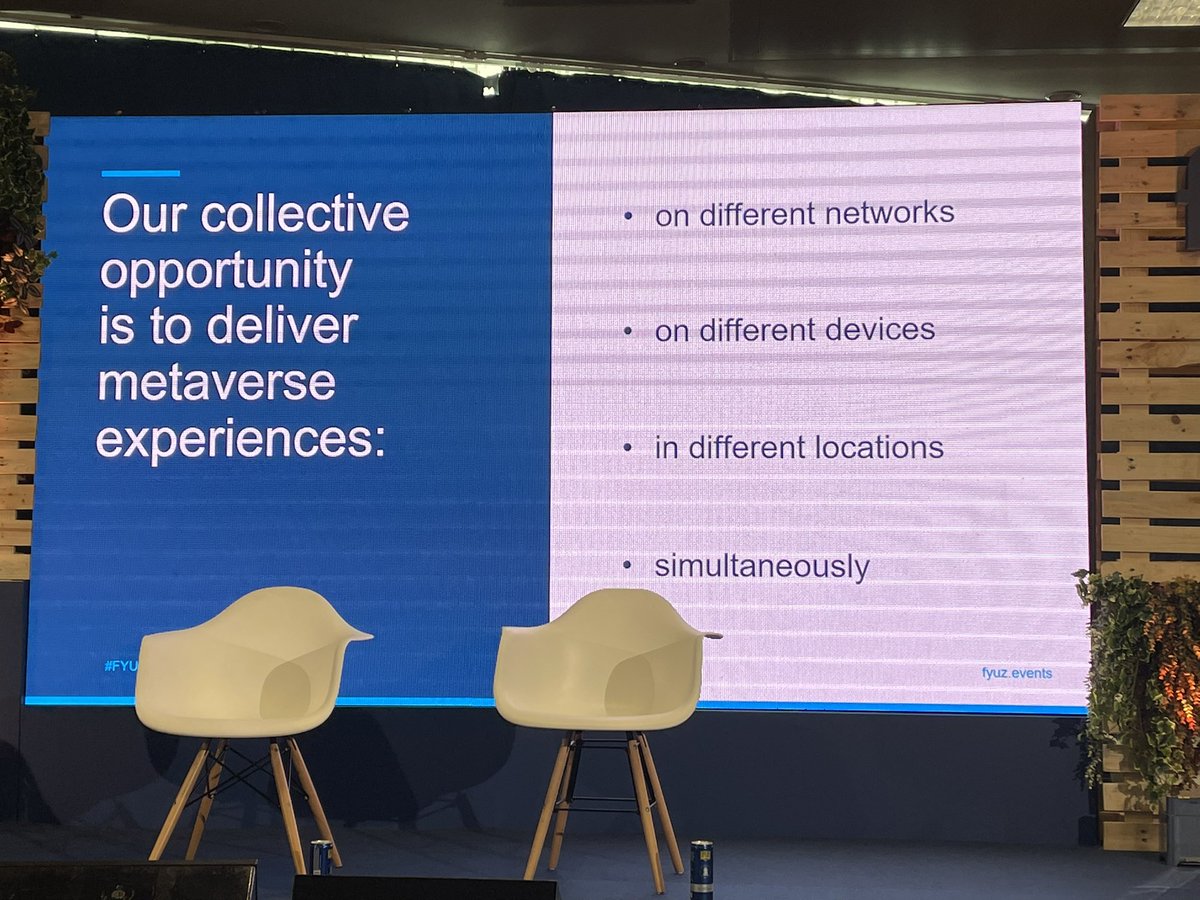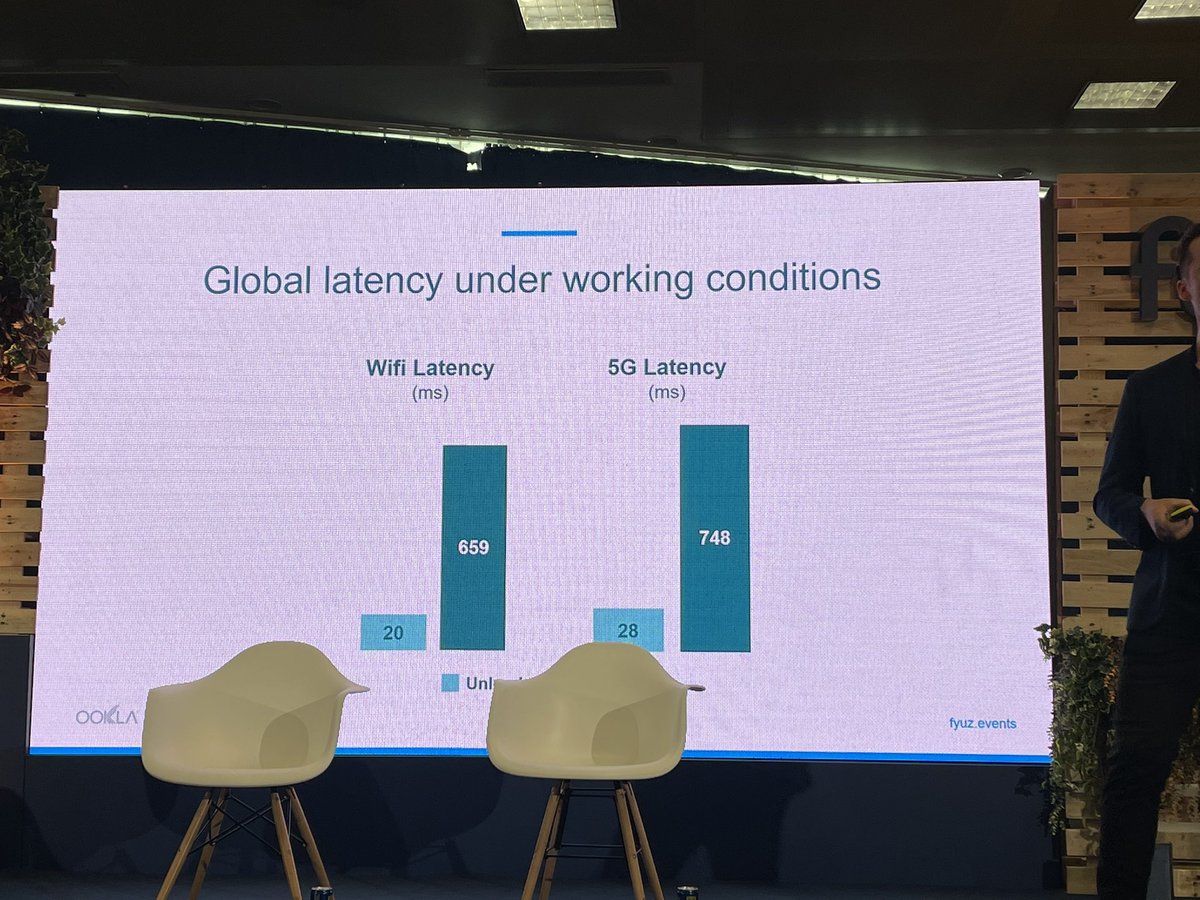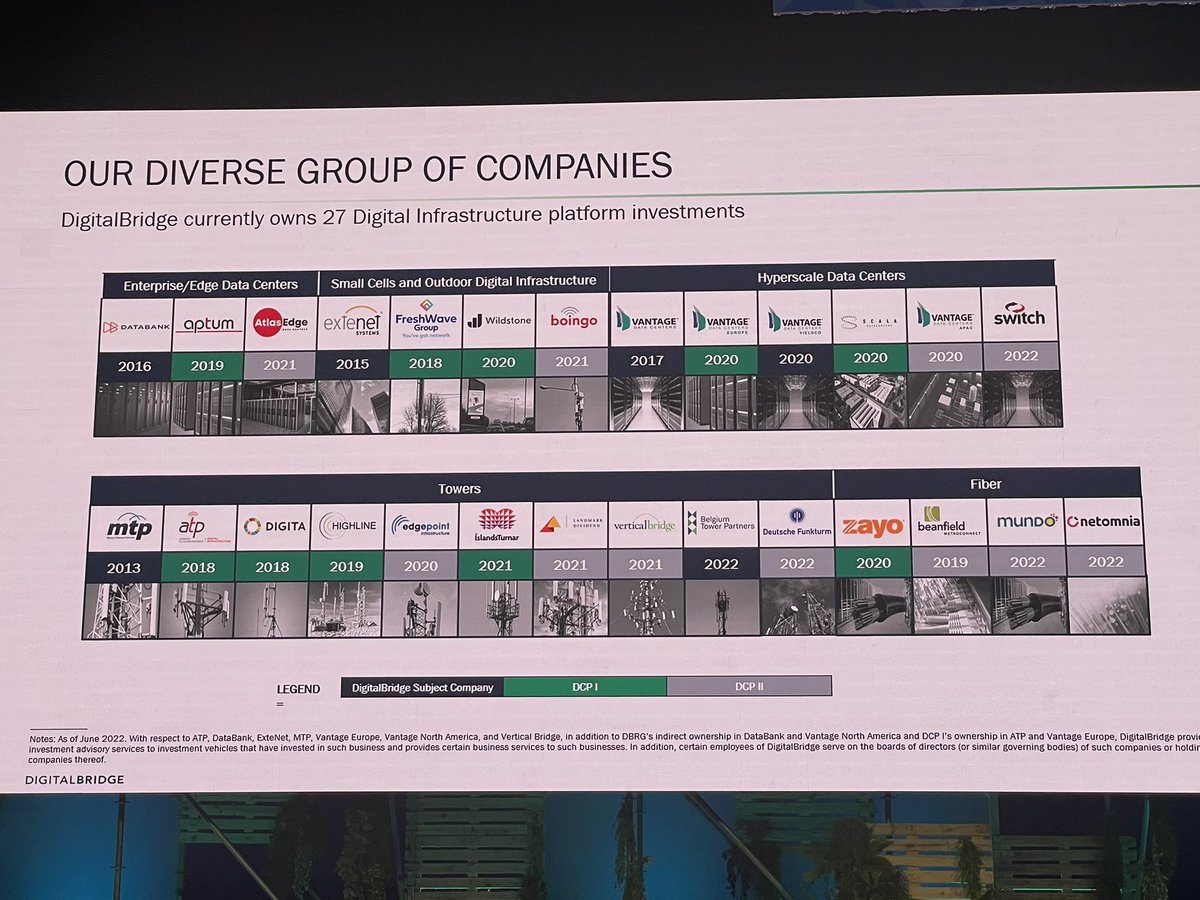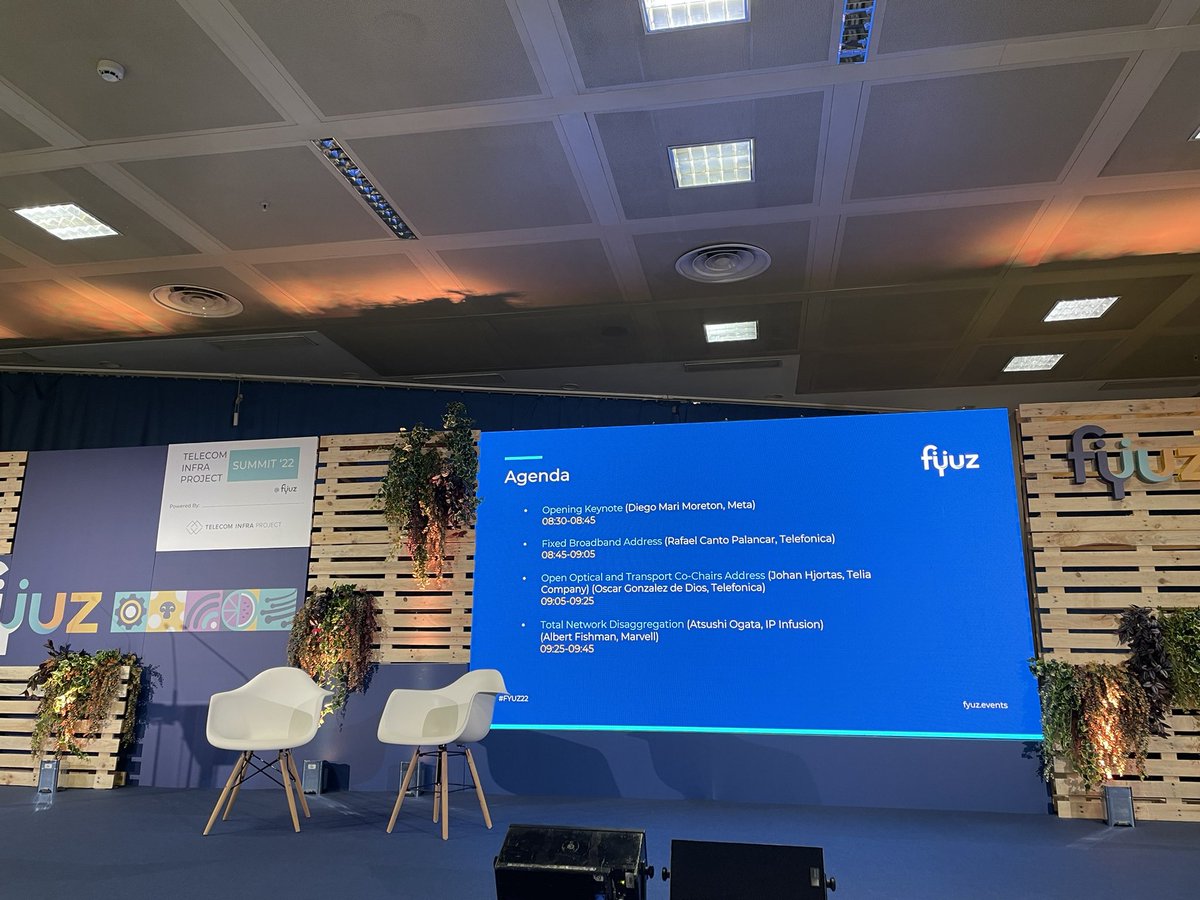
Back at #Fyuz22 for the #metaverse connectivity session
Curious to see the balance of “the metaverse” vs “a metaverse” in discussion and presentations
Curious to see the balance of “the metaverse” vs “a metaverse” in discussion and presentations

(A bit of history - I wrote one of the first ever market research reports on #VR #VirtualReality in about 1995, when I was working at UK analyst firm Datamonitor. It was published by FT Managerment Reports. Wish I could find a copy to look at my predictions again)
Speakers talking about metaverse use-cases
Accenture sees MV as a “deep stack”, not just an app layer. Referencing creator economy, customer engagement for brands etc
Vodafone panellist talking about “exploration” and travel uses
Accenture sees MV as a “deep stack”, not just an app layer. Referencing creator economy, customer engagement for brands etc
Vodafone panellist talking about “exploration” and travel uses
Accenture talking about training & HR, eg onboarding new hires
Referenced “hybrids” viewable in VR gear, or on a laptop screen. I agree that’s a likely model for many applications
Referenced “hybrids” viewable in VR gear, or on a laptop screen. I agree that’s a likely model for many applications
Speaker from company called Utopia Voyagers
Sees AR about 3-4 years away for mainstream adoption
Could bring “superpowers” eg wayfinding in the real world etc
Panel asked about “non-gaming” uses
Sees AR about 3-4 years away for mainstream adoption
Could bring “superpowers” eg wayfinding in the real world etc
Panel asked about “non-gaming” uses
VF panellist saying that MV advertising can combine models for traditional physical advertising / merchandising with online ad models
Here’s a question - will the rise of metaverse apps be what finally nudges some of the more WiFi-skeptic mobile operators to embrace it more properly?
I quite like the Accenture comment about post-sales support for enterprises eg offering AR based instruction manuals & troubleshooting systems
Mentions manufacturing & retail as two key verticals
Drops in the word “blockchain” for identity. I’m unconvinced
Mentions manufacturing & retail as two key verticals
Drops in the word “blockchain” for identity. I’m unconvinced
Ah - now pivoting discussion to telcos & oppo for connectivity providers
Accenture panellist talking about need for ubiquitous connectivity & drops the “network slicing” phrase
Doesn’t mention the word “indoor”. Mostly vendor waffle IMO
Accenture panellist talking about need for ubiquitous connectivity & drops the “network slicing” phrase
Doesn’t mention the word “indoor”. Mostly vendor waffle IMO
VF speaker mentions infra & edge computing
Don’t think they realise relevance of interconnect / peering
Then talking about identity and a “single wallet”. Yeah, right that’s a telco oppo
Then mentions “monetisation” vs being “connectivity pipes” - dodgy 5G ROI argument now
Don’t think they realise relevance of interconnect / peering
Then talking about identity and a “single wallet”. Yeah, right that’s a telco oppo
Then mentions “monetisation” vs being “connectivity pipes” - dodgy 5G ROI argument now
Moderator from @meta suggests telcos could be channel partners for distributing VR/MV devices
I'm hearing a lot more #edgecomputing hype here - and network edge - which seems pretty unrealistic for me. I really doubt there will be a massive distributed MV-centric edge in 5G
I'm hearing a lot more #edgecomputing hype here - and network edge - which seems pretty unrealistic for me. I really doubt there will be a massive distributed MV-centric edge in 5G
Now a panel specifically on connectivity with @Fujitsu_Global @VodafoneGroup @nokia & @Qualcomm
#Fyuz22
#Fyuz22

Agree with Nokia panellist that XR/MV will be more uplink-centric than most of today's applications
Again mentions edge computing
Referencing sustainability & energy efficiency of networks
Haven't heard mention of WiFi, peering, or indoor performance issues yet
Again mentions edge computing
Referencing sustainability & energy efficiency of networks
Haven't heard mention of WiFi, peering, or indoor performance issues yet
Fujitsu - traffic flows are changing, remaining more at the edge rather than a "funnel" from device to core
Expect to see more edge-to-edge traffic, remaining locally. Fewer Layer 2/3 touchpoints
Different optical & wireless architecture needed
Expect to see more edge-to-edge traffic, remaining locally. Fewer Layer 2/3 touchpoints
Different optical & wireless architecture needed
Qualcomm "need to separate 5G use cases between AR and VR"
Most VR is indoors (yay!)
AR is more dynamic, outdoors, and 5G more relevant
Reality enters the room!! (sorry about the pun)
Most VR is indoors (yay!)
AR is more dynamic, outdoors, and 5G more relevant
Reality enters the room!! (sorry about the pun)
"5G is mostly tied to AR" [ie not VR] - @Qualcomm
Need to decide what is needed to be optimised for that
Need to decide what is needed to be optimised for that
@Qualcomm Nokia now also mentioning VR being used at home & in enterprise... and then links that to PON/other optical networks, plus IP infrastructure
Then dedicated networks for industry traffic (private 5G) with optimisations for uplink etc
Still no mention of WiFi....
Then dedicated networks for industry traffic (private 5G) with optimisations for uplink etc
Still no mention of WiFi....
@Qualcomm "What tasks can be offloaded from the device?"
Qualcomm - For AR - some will be done on your phone rather than the glass/headset, some will go to the network
Potential to use MEC for AI accelerators.
Also talks about "residential MEC" ie putting more compute in home gateways
Qualcomm - For AR - some will be done on your phone rather than the glass/headset, some will go to the network
Potential to use MEC for AI accelerators.
Also talks about "residential MEC" ie putting more compute in home gateways
@Qualcomm Interesting from Nokia panellist - in early trials with AR/VR, some devices created much more signalling traffic initially and needed optimisation
@Qualcomm Qualcomm - latency is fundamental for AR and mixed reality. Need to map visuals to direction of view/movement of user. Needs URLLC
Needs densification of networks, eg via mmWave (Qualcomm's favourite topic!)
And 5G RedCap = smaller, lighter chips
Needs densification of networks, eg via mmWave (Qualcomm's favourite topic!)
And 5G RedCap = smaller, lighter chips
@Qualcomm Qualcomm: Sees main challenges as optics & industrial design, not the comms aspects. Need to fix image projection & lighter/thinner imaging
Nokia: need standards & cooperation in industry, interop between devices and applications. Need to optimise a good QoE & make it affordable
Nokia: need standards & cooperation in industry, interop between devices and applications. Need to optimise a good QoE & make it affordable
@Qualcomm Fujitsu - need to uprate infrastructure for QoE, eg network slicing for 5G, application-awareness for network.
(I think that's very wrong for multiple reasons)
Optical infrastr = more about raw capacity need, move to optical switching
(I think that's very wrong for multiple reasons)
Optical infrastr = more about raw capacity need, move to optical switching
@Qualcomm Now @Telefonica and @comcast talking about "metaverse-ready" networks
Note to #fyuz22 organisers - it's a huge mistake not having Q&A during the main stage sessions. Should have ditched some of the food/chef stuff & done audience engagement instead with the extra time
Note to #fyuz22 organisers - it's a huge mistake not having Q&A during the main stage sessions. Should have ditched some of the food/chef stuff & done audience engagement instead with the extra time
@Qualcomm @Telefonica @comcast TEF - talking about general stuff about network automation, slicing, APIs etc
"Not just for the metaverse" - well yes. If slicing ever works properly (unlikely) there's 100 more important applications than metaverse
"Not just for the metaverse" - well yes. If slicing ever works properly (unlikely) there's 100 more important applications than metaverse
@Qualcomm @Telefonica @comcast I can see the value of using metaverse as a thought-experiment, perhaps. There will be so many different metaverse types & suppliers/stakeholders, that it will cover most of the underlying challenges (eg getting slices to work indoors or in areas of poor coverage)
@Qualcomm @Telefonica @comcast Comcast speaker - general background on the company, especially cable but also including its MVNO business (I guess not everyone in Europe knows them)
Ah... mentions WiFi (with 20m hotspots) and also CBRS for high traffic areas
Being "proactive in understanding S-curves"...
Ah... mentions WiFi (with 20m hotspots) and also CBRS for high traffic areas
Being "proactive in understanding S-curves"...
@Qualcomm @Telefonica @comcast ... so watching VR/AR closely in case it leads to a change in user behaviour and network traffic patterns, hence engaging with Meta etc
Also Sky (acquired by Comcast) doing stuff on XR apps and services
Refs full-duplex cable in DOCSIS4.0 for multi-Gbps symmetrical
Also Sky (acquired by Comcast) doing stuff on XR apps and services
Refs full-duplex cable in DOCSIS4.0 for multi-Gbps symmetrical
@Qualcomm @Telefonica @comcast Points out that end to end includes its investment in WiFi inside the home "extension of the network"
TEF - mentions that VR "starts at home". Means fibre (low latency and high throughput). Using WiFi at home, working to improve the CPE, prioritisation etc
Thinks 5G needs edge
TEF - mentions that VR "starts at home". Means fibre (low latency and high throughput). Using WiFi at home, working to improve the CPE, prioritisation etc
Thinks 5G needs edge
@Qualcomm @Telefonica @comcast Btw this is a really interesting format - it's a two-way fireside chat. Both speakers are asking each other questions. It's not one who is obviously the "moderator" or interviewer
@Qualcomm @Telefonica @comcast TEF speaker mentions NWDAF as a mechanism for monitoring and delivering 5G SLAs
Good Q from Comcast about how app devs & telcos can work together.
Some services will require very demanding capabilities from the network, others not. Doesn't think "best efforts" is enough
Good Q from Comcast about how app devs & telcos can work together.
Some services will require very demanding capabilities from the network, others not. Doesn't think "best efforts" is enough
@Qualcomm @Telefonica @comcast There's a lot of hope being pinned (again) on Network APIs
How will application decide which edge location to be onboard
Still no mention of peering / interconnect between operators
How will application decide which edge location to be onboard
Still no mention of peering / interconnect between operators
@Qualcomm @Telefonica @comcast TEF speaker wants to be able to prioritise different apps/flows on WiFi in the home
Wondering how the operator allows the *user* to determine what priorities are higher
eg a professional gamer will have a very different ranking of important apps to an exec doing WFH on Zoom
Wondering how the operator allows the *user* to determine what priorities are higher
eg a professional gamer will have a very different ranking of important apps to an exec doing WFH on Zoom
@Qualcomm @Telefonica @comcast Some good stuff here, but I can't help but think that metaverse is being used by telcos as a convenient excuse / lever to push for changing rules on Net Neutrality etc
Had a demo on the @Meta #HorizonWorkrooms VR / metaverse business meeting setup using its Quest 2 headset
It’s interesting certainly, but not actually “useful” at the moment
It’s interesting certainly, but not actually “useful” at the moment
Now I’m the session on measuring connectivity performance
*finally* there’s a recognition that people will be on different networks
@Meta @Meta_Cx looking at problems & pain-points
3 use-cases being considered - video calling, 2D gaming and cloud rendered VR


*finally* there’s a recognition that people will be on different networks
@Meta @Meta_Cx looking at problems & pain-points
3 use-cases being considered - video calling, 2D gaming and cloud rendered VR



Interesting to see target latencies and required speeds
25ms round trip does not imply dense edge compute (& is mostly just on fixed + WiFi)
25ms round trip does not imply dense edge compute (& is mostly just on fixed + WiFi)
… but not much data on uplink speeds
Now @Speedtest talking about consistency & how to measure it
8.3ms is a magic number for 120 frames per second
Now @Speedtest talking about consistency & how to measure it
8.3ms is a magic number for 120 frames per second

Panel session on metaverse metrics and measurements
Various comments on latencies, jitter etc
AnalysysMason panellist mentions that @vaporio is looking at environmental APIs, eg ability to choose compute based on energy footprint
Also - how to do horizontal monitoring layer
Various comments on latencies, jitter etc
AnalysysMason panellist mentions that @vaporio is looking at environmental APIs, eg ability to choose compute based on energy footprint
Also - how to do horizontal monitoring layer
@vaporio Which is most important:
"Observability" - not really a metric
"Consistency"
or "Jitter" (the room chooses this)
"Observability" - not really a metric
"Consistency"
or "Jitter" (the room chooses this)
@vaporio Big diff for network rqts for interactive things like gaming vs. viewing streams
Bit of a Heisenberg problem on active vs. passive measurements - risk of changing the status of something you're trying to measure
Phrase from @meta panellist is "QoS profile" (multi-variable)
Bit of a Heisenberg problem on active vs. passive measurements - risk of changing the status of something you're trying to measure
Phrase from @meta panellist is "QoS profile" (multi-variable)
@vaporio @Meta Talks about latency budget - although I don't think latency is additive across multiple legs/functions (I'm sure @mtaht will have a view)
A-M panellist unconvinced that the hacks used in multiplayer gaming will translate across to metaverse domain
A-M panellist unconvinced that the hacks used in multiplayer gaming will translate across to metaverse domain
@vaporio @Meta @mtaht Videocalling - you can synchronise delays to the worst of the participants ("graceful degradation")
Will that work for metaverse? Maybe, and sometimes have hard limits on speed of light
Will that work for metaverse? Maybe, and sometimes have hard limits on speed of light
@vaporio @Meta @mtaht "Where is the compute"
A-M panellist saying that inertia of hyperscale has probably slowed down deployment & economics of edge compute
Sees CDNs turning into interconnected edge, eg Cloudflare
He's less certain about streetside cabinets in the telecom network as edges
A-M panellist saying that inertia of hyperscale has probably slowed down deployment & economics of edge compute
Sees CDNs turning into interconnected edge, eg Cloudflare
He's less certain about streetside cabinets in the telecom network as edges
@vaporio @Meta @mtaht Ookla panellist talking about "what's the use case" for edge & how does that translate to investment
Hence 8.3 millisecond target from frame-rate refresh (which implies about 1000km for light in fibre + infrastr)
Hence 8.3 millisecond target from frame-rate refresh (which implies about 1000km for light in fibre + infrastr)
@vaporio @Meta @mtaht Wow, a possible realistic use case for blockchain: sharing network performance / experience measurements securely & privately, to enable true end-to-end visibility without compromising user rights to privacy (eg imagine a telemedicine app sharing perf data with the network)
@vaporio @Meta @mtaht Q from Telefonica audience member - essentially "can an app developer pay for better network performance?"
(ie can we sell slices to MV devs)
Not said: they'd need to pay (& do contracts with) 800 MNOs, 1000s of ISPs and still wouldn't deal with cross-network performance
(ie can we sell slices to MV devs)
Not said: they'd need to pay (& do contracts with) 800 MNOs, 1000s of ISPs and still wouldn't deal with cross-network performance
Next panel - good to hear @meta talking about peering and interconnect for #metaverse
… CSPs, cloudcos, content cos etc
Meta working with Internet Society to scale peering worldwide & also advising neutral data centre operators on best locations
… CSPs, cloudcos, content cos etc
Meta working with Internet Society to scale peering worldwide & also advising neutral data centre operators on best locations

Now @awscloud saying the #edgecomputing is not just about bringing the infra to the edge, but also platform & APIs closer to the user
“Cloud continuum” = same APIs everywhere
“Cloud continuum” = same APIs everywhere
“Skyrocketing downwards”
Interesting phrasing from Accenture panellist about energy consumption & battery level on a device using GPUs
Talks about offloading compute to edge nodes
Seems to be a bit too bought into the 5Gwash notion of MEC, IMO
Interesting phrasing from Accenture panellist about energy consumption & battery level on a device using GPUs
Talks about offloading compute to edge nodes
Seems to be a bit too bought into the 5Gwash notion of MEC, IMO
AR / MR is more latency sensitive as you can see the world around you
Talks about using anticipation - working out where you’ll look next based on movement
“We’ll never get networks to zero latency”
Talks about using anticipation - working out where you’ll look next based on movement
“We’ll never get networks to zero latency”
AWS panellist saying they want to help telcos move up the value chain (ie benefit from MV / edge)
Very politically correct (in a telco sense) but overlooks the dominant role of fibre / fixed operators
(Sidenote: that's prob harder with open-access wholesale FTTX + retail ISPs)
Very politically correct (in a telco sense) but overlooks the dominant role of fibre / fixed operators
(Sidenote: that's prob harder with open-access wholesale FTTX + retail ISPs)
AR & VR unlikely to converge - that's from @Meta head of AR hardware
Says it's really hard to offer *consistent* connectivity outdoors, and will need coordination between app layer & multiple layers of network stack
Says it's really hard to offer *consistent* connectivity outdoors, and will need coordination between app layer & multiple layers of network stack
@Meta A couple of people from @meta have mentioned fitness today as an important VR / metaverse use-case of its Quest headsets - and that they were somewhat surprised by it
Worth keeping a watch on that as a possible unexpected "killer app" - not just gaming.
Worth keeping a watch on that as a possible unexpected "killer app" - not just gaming.
@awscloud panellist pushing hard on the "telco to techco" transition & monetising metaverse for CSPs... although his role *is* the head of network transformation for telcos, so I guess is pitching cloud/edge (AWS-branded obviously) as a key enabler for this
@awscloud And that's it from me for #FYUZ22
Heading to the airport....
Thanks to @TelecomInfraP for the invitation!
Heading to the airport....
Thanks to @TelecomInfraP for the invitation!
• • •
Missing some Tweet in this thread? You can try to
force a refresh





















